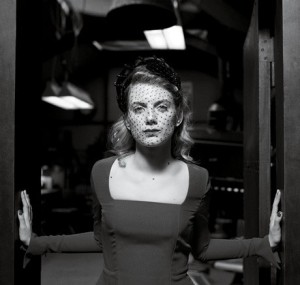*Absolutely no spoilers, apart from description of one initial scene*
In the first of the five chapters that Inglourious Basterds is divided into, a Nazi general philosophises about rodents with a man and scares him enough for him to give away the people hiding under the floor. One woman somehow escapes the bullets and runs across a beautiful grassland all the while being eyed by the Nazi officer. He doesn’t shoot and nor do his soldiers. He waits. He waits till she is a body-length away before fading from view. He takes aim. He shoots. His gun’s run out of bullets.

Mélanie Laurent in one of the many super moments
All the two and a half hours of this film are made of such brilliant scenes and most of them are unpredictable. For Quentin Tarantino, this isn’t new, these small moments are his calling card. When the air-hostess of Pam Grier walks into the airport terminal in Jackie Brown, it’s his moment. When a group of odd-named characters sit around a table discussing tipping waitresses, it’s his moment. When a drugged assassin has one shot, only one shot, at stabbing a life-saving syringe into the heart of his boss’ woman, it’s Tarantino’s moment. He is a connoisseur of his own taste: a taste built on watching movies, absorbing heroes and living their stories.
Inglourious Basterds is another one for himself and his taste. He picks a genre (war, here), goes back a few years to the World War, stops at regular intervals to choose people to pay small tributes to and just has fun with blood and gore. The violence is extreme but he makes it look cinematically ravishing. Faces are smashed, throats are slit, tons of bullets burst into tons of bodies and blood even floats like confetti. You wince at a man being disfigured, but you still wait for the next round of gore because it is just so well made. The violence repels, the image attracts. Add music to it, give the characters a blessed array of actors and you have a winner on hand. Almost a winner on hand.
The problem that the film has is what Reservoir Dogs and Pulp Fiction didn’t have. Cut up Inglourious Basterds into small pieces and each piece can make for a masterpiece. Together, they step on each other. At 150+ minutes, it doesn’t feel long at all. It doesn’t feel like one film either. Each character has credibility, a reason to be on screen. Yet, when it’s time to collect everyone in time for sundown, you realise they’ve strayed away. There is something lacking in the whole experience. It isn’t depth, for the characters are so, so full of life that you almost feel it’s a chess board in front of you. Perhaps it is the knowledge that there is only so much Tarantino leaves himself as options while the film zips to its climax. The surprise is only in how the film reaches that climax.
All this makes Inglourious Basterds feel like a fine experience, and an incomplete film. Would a few ordinary scenes have provided solidity to it? Was there a need for, as they say in football, the water-career, the one who isn’t flamboyant but does the dirty work for others? Maybe it needed a bit of ugliness. Maybe it needed a context to make us appreciate the final scene for its importance to the film than for us to rejoice at its ingenuity. Inglorious? No. Ingenious, yes. Basterd, maybe.

Waiting to see!
Just saw the movie half an hour back. The gut reaction is a mixture of sheer enjoyment and admiration. What an excellent review you have written!